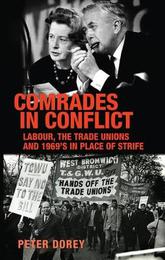
|
Comrades in Conflict: Labour, the Trade Unions and 1969's in Place of Strife
Paperback / softback
Main Details
| Title |
Comrades in Conflict: Labour, the Trade Unions and 1969's in Place of Strife
|
| Authors and Contributors |
By (author) Peter Dorey
|
| Physical Properties |
| Format:Paperback / softback | | Pages:240 | | Dimensions(mm): Height 234,Width 156 |
|
| Category/Genre | British and Irish History |
|---|
| ISBN/Barcode |
9781526148032
|
| Classifications | Dewey:331.88094109046 |
|---|
| Audience | | Tertiary Education (US: College) | | Professional & Vocational | | General | |
|---|
| Illustrations |
3 tables
|
|
Publishing Details |
| Publisher |
Manchester University Press
|
| Imprint |
Manchester University Press
|
| Publication Date |
19 February 2020 |
| Publication Country |
United Kingdom
|
Description
On the 50th anniversary of In Place of Strife, this scholarly study makes extensive use of previously unpublished archival and other primary sources to explain why Harold Wilson and Barbara Castle embarked on legislation to regulate the trade unions and curb strikes, and why this aroused such strong opposition, not just from the unions, but within the Cabinet and among backbench Labour MPs. This opposition transcended the orthodox ideological divisions, making temporary allies of traditional adversaries in the Party. Even Wilson's threats either to resign, or call a general election, if his MPs and Ministers failed to support him and Castle, were treated with derision. His colleagues called Wilson's bluff, and forced him to abandon the legislation, in return for a 'solemn and binding' pledge by the trade unions to 'put their own house in order' in tackling strikes. -- .
Author Biography
Peter Dorey is Professor of British Politics in the School of Law and Politics at Cardiff University -- .
Reviews'Dorey's detailed yet highly engaged text will become a reference point and benchmark for rethinking the decline of the post-war social-democratic consensus and the nuances of industrial-relations politics. It is well written and a significant insight into the Labour Party and trade union movement of the time. It also reveals the importance of locating the specifics of political discussions and choices in the realm of political relations and historical contexts.' Labour History Review -- .
|